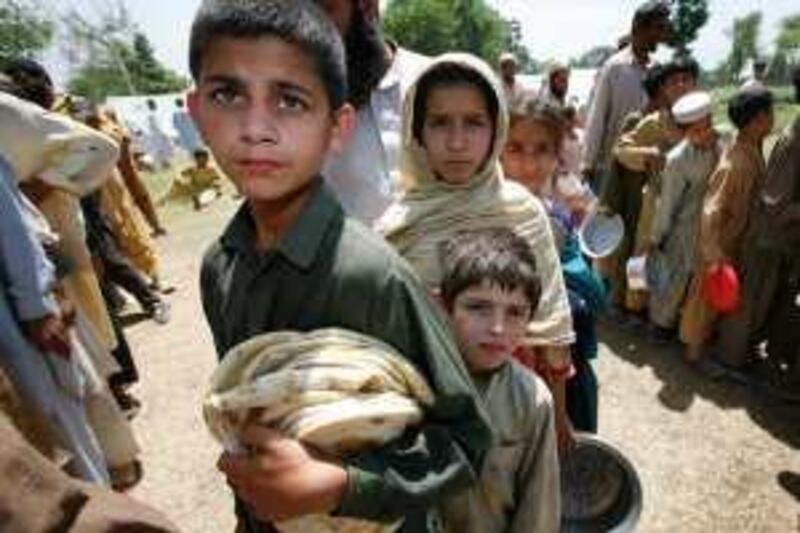ISLAMABAD // Refugees of Pakistan's beleaguered Swat valley continued to flee to safe havens as a military offensive against Taliban fighters intensifies. Doctors rushed to treat an influx of wounded Pakistani civilians yesterday as thousands of troops backed by bomb-dropping planes sought to purge Taliban militants from the north-western valley. The latest surge in violence between the Pakistani military and Taliban fighters in Swat and neighbouring districts follows the collapse of a fragile peace deal signed in February which promised the long-demanded implementation of Sharia law in the region in return for a ceasefire.
An army spokesman said its full-scale assault had killed more than 195 since Friday including 55 yesterday, with 10 troops reportedly killed in the clashes. The army says it is reinforcing the 12,000 to 15,000 troops in Swat as they take on 4,000 to 5,000 militants, including a small number of foreigners and hardened fighters from the South Waziristan border region. South Waziristan has been the scene of numerous suspected US missile attacks in recent months, including yesterday's strike in the Tabai area. A Pakistani army spokesman yesterday rejected claims the operation was launched under US pressure.
"We analyse the threats keeping in view the national interest and not on the dictates of external powers," he said. Meanwhile, Asif Ali Zardari, the president of Pakistan, continued his speaking tour in the United States following his meeting last week with US President Barack Obama, in an effort to rally international support for this latest military operation. In an interview with the American public television network PBS on Friday night, Mr Zardari pledged to mount an all-out war against Taliban extremists, vowing to kill the militants in this military offensive.
"This is an offensive - this is war," he said in the interview. "If they kill our soldiers, then we do the same." Yusaf Raza Gilani, the prime minister of Pakistan, said aid in the amount of one billion rupees (Dh44 million) would be allocated to help the estimated one million people who have fled the Swat valley, as well as the districts of Buner and Dir, since last August. However, several domestic analysts such as Ikhram Sehgal, managing editor of Pakistan's Defence Journal, believe this amount is nowhere near sufficient.
"One billion rupees is a joke," he said. "The UNHCR [the UN refugee agency] says it takes US$3 (Dh11) a day to feed one person - multiply that with one million refugees. In one month you need $90 million, or 72 billion rupees - and that's for food alone." Sheikh Khalifa bin Zayed, President of the UAE, has instructed the Khalifa bin Zayed Charity Foundation to deliver urgent humanitarian assistance to people in Swat who were forced to leave their homes due to the fighting, the state news agency, WAM, reported. The value of the assistance has not yet been released.
The current mass migration has also sparked security concerns, with as many as 200,000 people believed to have fled their homes in the past week, and another 300,000 who may be forced to move, according to the UN. Mr Sehgal said Pakistani forces, already spread thin by the current military operation in Swat, will be under pressure to maintain law and order. "It is a sore point," he said. "Whenever refugees on this massive scale come out, if there is not enough room for them, it sparks frustration, then you have significant security considerations."
A Swat-based journalist who spoke on condition of anonymity said as of yesterday, many people were still in Swat, many of them unable to flee for fear of being caught in the crossfire. An army statement said Taliban fighters were "trying to block the exodus of innocent civilians by preventing their departure through coercion, IEDs [improvised explosive devices], roadblocks with trees and even [making them] hostages".
People fleeing the area have accused the military of also killing civilians in the fierce bombardment. Aftaba Begum, 60, told Agence France-Presse in Jalala refugee camp near the town of Mardan that she had fractured her leg as shells from helicopter gunships hit Mingora three days ago. Several international aid agencies have raised concerns about their inability to reach civilians in areas where the fighting has intensified.
"Up until two weeks ago we had teams going into Swat and Dir but because of the fighting, our interlocutors cannot give us the security assurances we need," said Sebastian Brack, a Pakistan-based spokesman for the International Committee for the Red Cross. "Our only protection is based on a relationship of trust with the army and armed opposition but both sides have told us that they cannot guarantee our safety because the situation has become so volatile."
@Email:vsalama@thenational.ae * With additional reporting by Agence France-Presse





